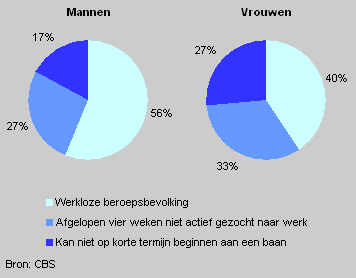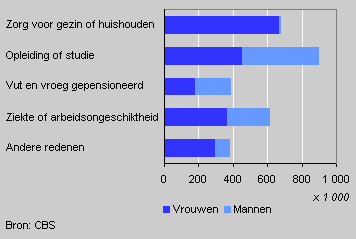Who doesn't have a paid job?

In 2003 there were about 840 thousand people who wanted to work for twelve hours a week or more. Almost half are classified as the unemployed labour force. Then there are nearly 3 million people aged between 15 and 65 who cannot or do not want to work. The reason given for this by one third is education. One third is ill, on disablement or has already retired.
Not everyone who wants to work is considered unemployed
396 Thousand people unemployed in 2003. They are actively looking for a paid job of twelve hours a week or more, and can start working almost right away. But there are more people who want jobs: over 440 thousand in 2003. They are not defined as unemployed labour force because they are not actively looking for work, or they can only start work after a while. So in total there are almost 840 thousand people who want to work. Over half are women.
People aged 15-65 who want paid work, 2003

Women often cannot start immediately
In 2003 only 40 percent of the women who want a paid job belonged to the unemployed labour force. Nearly a quarter of the women who want to work indicated that they cannot start immediately. This is true for one in six men.
Almost 3 million people on the sidelines
In 2003 there were nearly 3 million people aged 15-65 who did not want to or could not work. They have various reasons. Almost 900 thousand people were studying, most of them aged under 25. Illness or labour disablement was the main reason not to want to work for over 600 thousand people.
Reasons to renounce paid work, 2003

There were over 680 thousand people who do not want a paid job because they care for a family or household. This group consists almost entirely of women. And there were 390 thousand people on early or regular retirement. Why the remaining group of almost 400 thousand people cannot or does not want to work is not known.
Ingrid Beckers